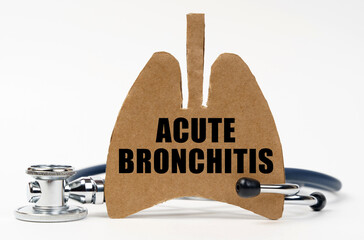Acute bronchitis can be an unwelcome guest, showing up just when you think you’re over a cold. It’s a common condition, often leaving you glitching away as your body struggles to get rid of excess mucus. Imagine your airways throwing a tantrum–swollen, irritated, and clogged with mucus–and voilà, you’ve got acute bronchitis. But before you start googling remedies or diagnosing yourself with pneumonia, let’s break it down.
What is Bronchitis?
Bronchitis is the inflammation of the bronchi—the tubes that transport air to and from your lungs. This condition causes these airways to swell, often producing extra mucus, leading to that notorious cough. Bronchitis comes in two types: Acute and Chronic.
What is Acute Bronchitis?
Acute bronchitis is essentially a short-term inflammation of the bronchial tubes, often following a viral infection. It’s one of the top reasons people head to the doctor, making its presence felt especially in colder months. Acute bronchitis mostly has a clear end in sight—though it might feel like forever when you’re coughing your lungs out.
Acute bronchitis involves the larger airways in your lungs, causing them to become irritated, inflamed, and filled with mucus. This condition typically affects healthy individuals and is more common in winter. Fortunately, it’s a self-limiting condition, meaning it usually clears up on its own after running its course over a few weeks.
Causes of Acute Bronchitis
Acute bronchitis is most commonly triggered by viral infections, responsible for about 90-95% of cases in healthy adults. You know, those delightful viruses that bring us colds, flu, and all their sneezing, coughing glory. The usual suspects are:
– Influenza A and B
– Rhinovirus
– Adenovirus
Bacterial infections, although rarer, can also lead to bronchitis, with pathogens like Mycoplasma pneumoniae and Chlamydia pneumoniae occasionally stepping up to the plate. But before you rush for antibiotics, hold on. Viral infections are the primary culprits, so antibiotics usually won’t help.
Acute bronchitis can also be caused by exposure to irritants like smoke, dust, or environmental pollutants. If you’re a smoker, you’re basically setting the stage for bronchitis to thrive. But even non-smokers who spend time in polluted environments can develop it.
Symptoms of Acute Bronchitis
At first the acute bronchitis shows up as, of course, the persistent cough. As the condition progresses, however, the cough might become more productive, meaning you’ll be hacking up mucus that ranges in color from clear to yellowish
Other symptoms of acute bronchitis include:
– Wheezing: That whistling sound when you breathe? It’s wheezing, due to irritated airways.
– Shortness of breath: Your lungs are working overtime to clear the airways, making you feel like you’ve just run a marathon.
– Fatigue: You’ll probably feel worn out, both from the illness itself and the effort it takes to cough up mucus.
– Mild fever and body aches: You may feel a bit achy and feverish.
The cough can last for up to three weeks, and in rare cases, even longer.
Diagnosis: Is It Bronchitis or Something Worse?
Diagnosing acute bronchitis is often straightforward. Doctors usually rely on a physical exam and medical history, listening for telltale signs like wheezing or rattling in your lungs. In most cases, no additional tests are needed. However, if you have a high fever, rapid heart rate, or chest pains, doctors may order a chest X-ray to rule out pneumonia, which presents with similar symptoms but is far more serious.
Treatment and Management
The good news? Acute bronchitis typically goes away on its own. The bad news? It might take a few weeks, and in the meantime, here’s how you can manage it:
1. Stay hydrated: Water helps thin the mucus, making it easier to expel. Warm fluids like tea with honey can also soothe your throat.
2. Rest: Your body is in fight mode. Give it time to recuperate and focus on healing.
3. Cough suppressants and expectorants: Over-the-counter medications like dextromethorphan can help manage a dry cough.
4. Inhalers: For those wheezing, a bronchodilator might be prescribed to open up the airways.
5. Avoid irritants: Stay away from smoke, fumes, and other irritants that could exacerbate your symptoms. If you smoke, now’s a good time to quit—your lungs will thank you.
What about antibiotics, you ask? Unless your doctor suspects a bacterial infection, antibiotics won’t help. And no, chugging orange juice won’t “flush out” the virus either. Just let your body work its magic.
Prevention: How to Avoid Acute Bronchitis

Prevention, as they say, is better than cure. Since acute bronchitis is often caused by viruses, some basic precautions can help keep it at bay:
– Wash your hands: It’s the simplest and most effective way to prevent viral infections.
– Get vaccinated: The flu shot can lower your risk of getting bronchitis during flu season.
– Avoid sick people: If your coworker is coughing up a storm, maybe send that email instead of dropping by their desk.
Some FAQS:
1.Does air pollution contribute to acute bronchitis?
-Yes, exposure to air pollution can irritate the airways and trigger bronchitis.
2. What type of food should I eat while suffering from acute bronchitis?
-Consume warm fluids, soups, and nutrient-rich foods like fruits, vegetables, and whole grains to help your body heal.
3. Are there any long-term complications of acute bronchitis?
-While uncommon, severe cases can lead to pneumonia or other respiratory issues
4. Should I avoid exercising or heavy work?
– Yes, as your body is healing, a lot of rest is needed. It’s best to take rest and consult a doctor if there are any changes in symptoms or in case condition worsens.
Acute bronchitis is a common respiratory condition that can leave you feeling run-down and coughing for weeks. While it’s typically caused by viruses, it’s a self-limiting illness that will resolve on its own with time. The key to recovery lies in managing symptoms, staying hydrated, and getting plenty of rest. Although the cough can be persistent, most cases clear up without the need for medical intervention.


